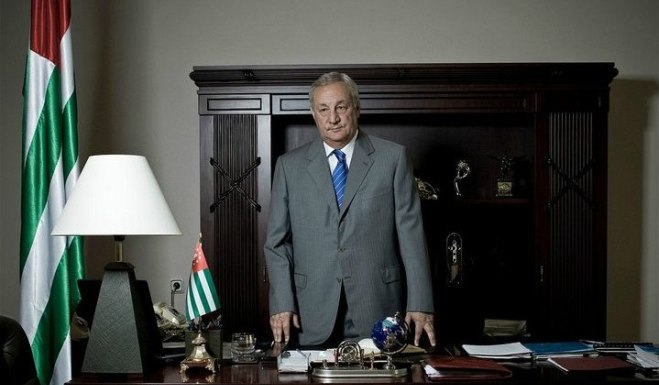Sergei Bagapsh, Abkhazia’s Leader, Dies at 62, by Ellen Barry

Sergei Bagapsh was the second president of the Republic of Abkhazia
The New York Times
MOSCOW — Sergei V. Bagapsh, who led the Black Sea enclave of Abkhazia through a tumultuous effort to gain independence from Georgia without being absorbed by Russia, died Sunday in Moscow. He was 62.
Mr. Bagapsh had successful surgery to remove growths on his lung on May 21, but succumbed to complications that ended in heart failure, medical officials told the Interfax news service.
The affable manner of Mr. Bagapsh, who governed Abkhazia as its president, concealed the strategic thinking of a chess player, a quality he used to maneuver the nationalist upheaval of the post-Soviet period. Though he was an ethnic Abkhaz, he married into a large Georgian family, and remained on good terms with his in-laws even as Abkhazia’s separatist war in the early 1990s tore the country apart.
The August 2008 war between Georgia and Russia was a victory for Mr. Bagapsh, who had long lobbied the Kremlin — or any other government, for that matter — to recognize Abkhazia as a sovereign nation. The slender wedge of beachfront land, once a cherished vacation spot for the Soviet nomenklatura, or ruling elite, was now under the protection of the Russian Army, and Mr. Bagapsh was received in Moscow as a bona fide head of state.
But he found himself in a far more difficult position than he had anticipated. Russians lined up immediately to grab prime real estate and privatize energy and transportation infrastructure, which could be crucial to preparations for the 2014 Winter Olympics in Sochi, Russia. Under extraordinary pressure from Russia to compromise, Mr. Bagapsh also had to answer domestic critics who accused him of selling off Abkhazia’s assets.
“After the August war, Abkhaz society — and this was also the tragedy of Bagapsh — is, if anything, more divided than it was before,” said Peter Semneby, the former European Union special representative to the South Caucasus, who met many times with Mr. Bagapsh.
“You have those who are very uncomfortable with the dominating role of Russia, and what they see as selling out, many of whom were behind the independence movement in the first place,” he said. “On the other hand, you have those who see a lot of economic opportunity. And these interests are very much being played out against each other.”
Both Russia’s president, Dmitri A. Medvedev, and its prime minister, Vladimir V. Putin, said on Sunday that they would view Mr. Bagapsh’s body to say farewell in person.
His death will very likely usher in a competition for power in Abkhazia, with Russia and Georgia jockeying for direct access to the next leader. Candidates for early presidential elections, scheduled for three months from now, will most likely include Prime Minister Sergei M. Shamba, who has advocated a “multivector” foreign policy that includes alliances with Turkey and the West; Vice President Aleksandr Ankvab, a close ally of Mr. Bagapsh; and Raul Khajimba, a former K.G.B. officer who left government to head an opposition party.
It has proved difficult to manipulate Abkhaz politics in the past. In 2004, Russia threw its weight behind Mr. Khajimba: pop stars were flown in to hold free concerts in his name; Mr. Putin, then the president, appeared with him on billboards; Russian lawmakers threatened to cut off the tangerine imports that were the territory’s economic lifeline. Mr. Bagapsh’s opponents, meanwhile, suggested he would cave to pressure from Tbilisi because his wife was Georgian.
Mr. Bagapsh won anyway. Russia imposed an import blockade, so that tons of tangerines rotted in trucks at the border. But Mr. Bagapsh moved into the presidential headquarters and set about negotiating with Mr. Khajimba, eventually forming a coalition government.
Recalling that brutal political war in an interview two years ago, Mr. Bagapsh was characteristically easygoing.
“I understood that it was politics, and it would pass, and I was right,” he said. “All the people who swore at me, said I was a mafioso and a bandit and so forth — today, they are my friends.”
Guram Odishariya, a writer, grew up not far from Mr. Bagapsh in the Abkhaz capital, known in Georgian as Sukhumi and in Abkhaz as Sukhum, a city where men gather on an embankment to play chess. Mr. Bagapsh showed an early aptitude for the long game, he said.
“He is the kind of person who plays 15 steps ahead,” he said. “There are leaders who play a child’s game, but Bagapsh is not one of them.”
Source: The New York Times